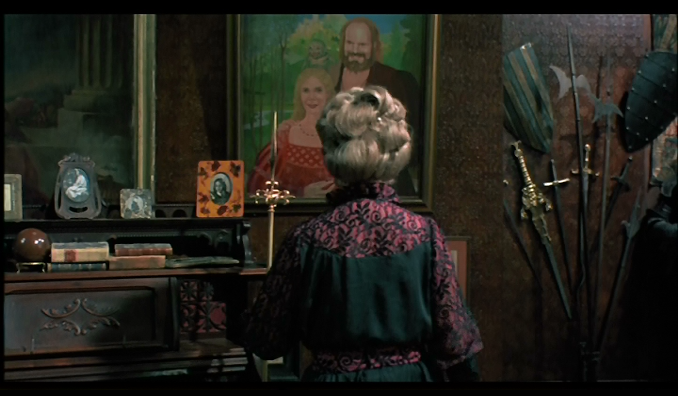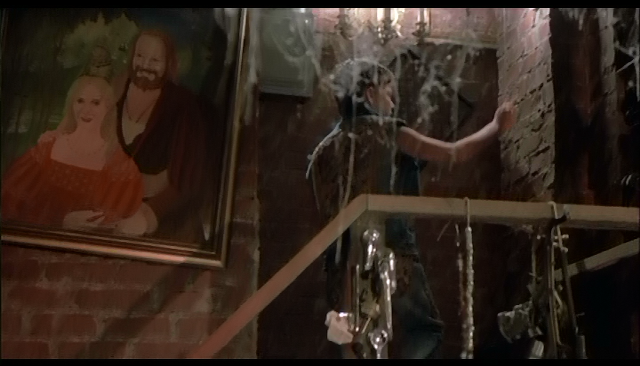That isn't the only way the two movies overlap, as Phil
Fondacaro (of Ghoulies 2 fame), the actor beneath Greaser Greg,
played Torok in Troll as well.
Manzini, perhaps struggling with some sense of unflappable paternity, delivers a somewhat rousing and motivational speech to the kids - justifying their imprisonment with the time-honored adage that "normies" (or non-uglies) will invariably seek out to destroy what they do not understand. This is one of the few points in the film where a sort of pseudo-moral becomes evident - a fleeting solidification of reason within the movie's otherwise unchallenged and chaotic pace of madness. This is of course immediately terminated without remorse by the simpering, snot-glossy smirk of Messy Tessy, as she reminds Dodger of the task at hand - that her, along with the rest of the Hills Have Eyes orphans, must help him claim the affection of Tangerine.
Dodger and Tangerine's forbidden love seems to be in close orbit to the film's central purpose (to gross one out) perhaps appealing to that juvenile urge to always have what we can only imagine we need. A thirst for the social forbidden. The children see the apparent gap as a non-issue, where as I always thought it was more of an issue of puberty.
During a trip to sell her clothes and fishing lures, Tangerine informs Dodger about the nature of the business. Be it selling questionable attire to elbow-and-knee-dancers at underage dance clubs or panhandling is left to viewer speculation. Juice shows up once again, cementing his role as the heel and ticking that last box on his dickhead checklist after taking all of Tangerine's earnings for the night.
At this point we're brought back to the kids and learn that some of their fellows are missing.
As they search other garbage pails, they mention Ultra Violet, and Banana Anna (originally Anna Banana), two legit characters who are MIA.
w~~60_35.JPG)

They're concerned with their friends but seem to have no recollection of how, when, or where they were lost. I guess the pail-searching is founded but contradicting to the earlier notion that ugly people are just as well, by insinuating they should all be found in garbage cans.
As Dodger's relationship with the kids matures, he learns that they can sew - a collective talent they somehow all share despite their varying degrees of physical deformity and mental shortcomings.
Nevertheless their effort is spot-on and professional, also surprisingly clean considering the amount of bodily fluids involved with their day to day existence.
Tangerine puts in an order and Dodger immediately interns the kids into labor, to create the needed demand within a grossly unrealistic deadline.
The solution rests on the film's singular musical number - a laborious song about friendship and working together during which they break into a tailor shop and steal the needed tools to complete their task. Dodger drives them with conviction, but they shirk their duties after he leaves and sneak into a movie theater. Once there they proceed to thieve food and be generally disruptive. Continuing their brand of destruction, they later crash a biker bar and cause a brawl. At this point one would think the only theme the movie has championed is that ugly people are easily manipulated, aggressive thugs who steal and break stuff. However, when Windy Winston befriends a biker after farting off a dude's mustache - a more universal tone is fleshed out - that of the lowest common denominator - showing us that Winston's man-salute signifies that great resonance of truth which brings us all together.
Upon returning, Dodger and Manzini express their concern for the safety of the missing kids. Those accounted for inform them of the 'State Home for the Ugly', a horrible place where they fear their friends have been imprisoned (much like Manzini's basement only government funded). I have to admit I sort of relished the appearance of the two Barney Fife-level officers patrolling the street mid-daylight with a giant butterfly net, sacking less than attractive people and locking them up in small cells labeled with their offense (IE too old, too fat, Clint Howard).
They locate the Home and make devise a plan to infiltrate it under the cover of night.
In the meantime Dodger and Tangerine start raking in their dirty money, profiting off the bent backs of their broken and subordinate workers.
Juice continues to profit as well - steamrolling his girlfriend and her stooge into surrendering their gains.
Once Tangerine is introduced to the kids, her venomous glands begin to salivate even more at the pretense of fast fame and cheap thrills. She folds their efforts under her label and the stage is set for her spearhead into the fashion world - a show at the local department store.
 |
| Tormenting Tangerine 45b. |
Tangerine tightens her grip on Dodger by adding seductive undertones to her demands - and threatens to report the kids to the State if they show their proud faces at the fashion show. She also begins to manipulate Dodger more often, slacking his plans to help rescue the missing Garbage Pails.
The movie begins to escalate - rolling toward its explosive (literal meaning upcoming) conclusion.
 |
| Disgusted Dodger 31a. |

